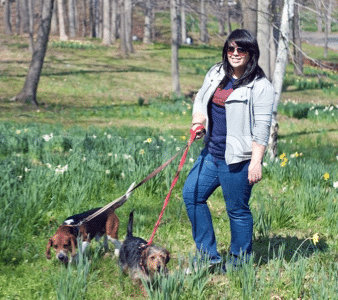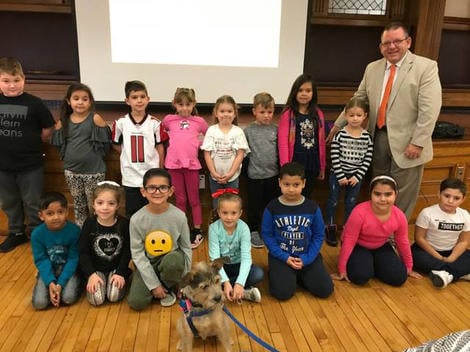
In 2016, the NYC Department of Education rolled out the Comfort Dog program as part of the Office of Counseling Support Programs. The initial phase included seven schools across the city. In September 2017, the DOE expanded the program by 30 schools. There are six Staten Island schools participating in the program through the recent expansion– P.S. 22, Staten Island Technical HS, SI School of Civic Leadership, The Michael J. Petrides School, I.S. 7, and P.S. 1.
The DOE works closely with each school in the program to adopt a rescue animal that has been evaluated by the North Shore Animal League America. The school and a staff member who adopts the dog are provided with training and resources in the “Mutt-I-Gree” curriculum for free. The curriculum includes lesson plans and strategies to engage students and incorporate the dog into the school’s social-emotional supports.
Comfort dogs contribute to various aspects of a school culture and climate, including for both at-risk and mandated counseling. The dogs become an integral part of a school’s crisis intervention protocols and support de-escalation and bereavement counseling. The dogs have also become a support for teachers and other staff members as well.
“A comfort dog is a counseling support,” said Jaye Murray, Executive Director of the Office of Counseling Support Programs. “They possess the two most important qualities of an effective social worker or counselor–unconditional acceptance and warmth.”
The Comfort Dog program’s innovative approach to social-emotional learning provides students with life skills critical to their success, not only in the classroom but in other aspects of their lives as well. Social-emotional supports can be integrated into classroom teaching and guidance counseling to help students develop effective communication and teamwork, conflict-resolution and problem-solving techniques, and relationship building.
During my recent visit to P.S. 1 in Tottenville to present an Internet Safety – Cyberbullying student assembly, I had the opportunity to meet Banjo, PS 1’s newest family member. Banjo’s presence has helped improve student attendance and reinforced positive outcomes as classes earn a visit from Banjo for good behavior.
Banjo came to visit us during the K-2 Assembly. When he entered the auditorium, I immediately thought the students were going to be distracted and lose focus. I was truly amazed to see that it was quite the opposite. Some students briefly smiled, waved and called to Banjo, but without having to say a word they refocused on our discussion. I was extremely impressed and witnessed first-hand how Banjo has become part of the P.S. 1 family.

Although the benefits are great, there is also some apprehension surrounding the Comfort Dog program. Some families have raised concerns about the students with severe allergies being exposed. These students may be prone to asthma attacks brought on by the allergies to dogs, requiring maintenance medication and nebulizer treatments. The DOE has incorporated some protocols to reduce the impact on students with allergies. These protocols include avoiding student contact and interaction with the comfort dog, as well as adding an air purifier to the student’s classroom if the condition is extreme.
Schools that wish to participate should begin the discussion with their School Leadership Team (SLT), which is comprised of parent and staff members. If the school applies to the DOE and is accepted, they must provide parents the opportunity to opt out in writing of activities and contact with the comfort dog. At the November 6th Community Education Council 31 meeting we discussed these concerns regarding the comfort dog problem and requested that the DOE work to improve community outreach and impact on students with allergies and other health concerns that may be present.

If you’re looking for someone who’ll go bananas every time they see your dog or cat, knows them so well they notice one hair out of place, speaks their language, knows their favorite treat AND movie and most of all become their second favorite human in the whole world, then you’ve found the right person! Lisa resides in Westerleigh and is a Dogtec Certified Dog Walker, NYC Certified in Animal Care and Handling, FEMA Animals in Disasters Certified, a Trap-Neuter-Return (TNR) and Feral Colony Care Specialist and Red Cross Pet First Aid Certified.

